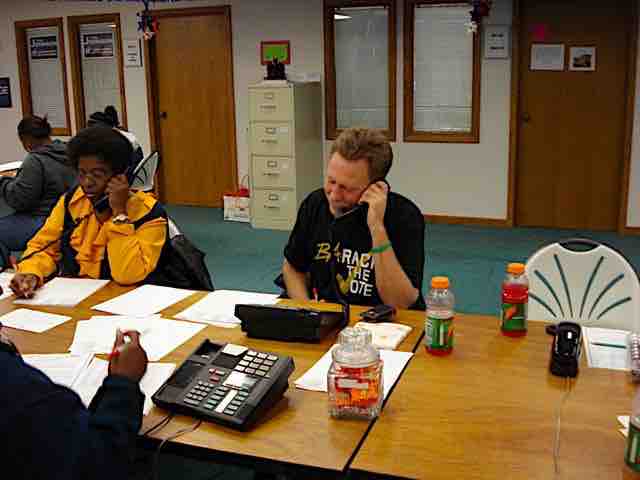Telemarketing
Telemarketing is a method of direct marketing in which a salesperson solicits prospective customers to buy products or services, either over the phone or through a subsequent face-to-face or Web conferencing appointment scheduled during the call . Telemarketing can also include recorded sales pitches programmed to be played over the phone via automatic dialing. Telemarketing has come under fire in recent years, being viewed as an annoyance and a disturbance by many. While many methods of marketing will suffer this criticism to some degree by those who prefer not to be disturbed, telemarketing seems to be criticized particularly because of its direct, intrusive nature. The two major categories of telemarketing are business-to-business and business-to-consumer.

Telemarketing
Author and activist Bob Wood places one of his numerous phone calls to residents in Muskegon County, Michigan.
Some important terms used in telemarketing are:
- Lead Generation - the gathering of information and contacts.
- Sales - using persuasion to sell a product or service.
- Outbound - proactive marketing in which prospective and preexisting customers are contacted directly.
- Inbound - reception of incoming orders and requests for information.
Demand is generally created by advertising, publicity, or the efforts of outside salespeople. Telemarketing may be done from a company office, from a call center, or from home. It may involve either a live operator or a recorded message, in which case it is known as "automated telemarketing" using voice broadcasting. "Robocalling" is a form of voice broadcasting that is most frequently associated with political messages. An effective telemarketing process often involves two or more calls. The first call (or series of calls) determines the customer's needs. The final call (or series of calls) motivates the customer to make a purchase.
Prospective customers are identified by various means, including past purchase history, previous requests for information, credit limit, competition entry forms, and application forms. Names may also be purchased from another company's consumer database or obtained from a telephone directory or another public list. The qualification process is intended to determine which customers are most likely to purchase the product or service. Charitable organizations, alumni associations, and political parties often use telemarketing to solicit donations. Marketing research companies use telemarketing techniques to survey the prospective or past customers of a client's business in order to assess market acceptance of or satisfaction with a particular product, service, brand, or company. Public opinion polls are conducted in a similar manner. Telemarketing techniques are also applied to other forms of electronic marketing using e-mail or fax messages, in which case they are frequently considered spam by receivers.